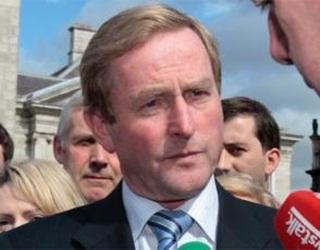Kenny has grown in stature, but tougher tests await

While many were critical of Enda Kenny before the general election, his popularity has risen during his time as Taoseach, in particular after his Dáil speech on the Cloyne report. Nevertheless he still faces significant challenges, writes Vincent Browne.
Enda Kenny has proved many commentators and half his parliamentary party (as they lined up a year ago) wrong.
Not just that: he has proved the electorate wrong, for it was obvious from a long time back that the vast majority of people lacked confidence in him as a prospective Taoiseach.
It is not that those of us who have opposed his politics have been proved wrong or that those of us who believed he was the captive of precisely that neo-liberal ideology that propelled us and the rest of the world into this financial calamity have been wrong. It is just we have been wrong about Kenny as a person.
Opinion polls showed that from the 2007 election on, the electorate grew more and more disenchanted with Kenny as a political leader, meaning his popularity rating was in progressive decline. Last October, he had a satisfaction rating of 25 per cent and a dissatisfaction rating of 59 per cent.
A few months before the general election, I (and others) wrote that at a time when the country needed a sense of where it was going, neither the then taoiseach, Brian Cowen, or the alternative taoiseach, Kenny, seemed to have the capacity to articulate such a sense. I am sceptical of the idea of ‘‘leader’’ because of its implication that there are ‘‘leaders’’ and ‘‘followers’’ in a society where the people themselves are the sovereign, but our political culture demanded some sense of leadership and that was absent.
Kenny’s elusiveness during the election campaign did not seem a good sign, either, just as his earlier career in politics had been thoroughly undistinguished.
He was an anonymous figure in the Dáil over 27 years, from the time he became a TD in 1975 until becoming Fine Gael leader in 2002.
He was minister for tourism and trade from 1994 to 1997 but, again, was almost anonymous. In fact his predecessor as leader of Fine Gael, Michael Noonan, thought so little of him that he did not appoint him even a deputy spokesman in 2001.
We assumed the status of office would enhance his stature once he became Taoiseach, but he has done far better than that. His standing now in the polls is far beyond anything he could have hoped for a year ago, running far ahead of his party’s rating, rather than the opposite. He has been more assured than he was ever previously.
He has also demonstrated a capacity that he had not shown previously to absorb briefs. And even though he is no visionary, so far he is more credible than his predecessor and his predecessor’s predecessor, than could have been envisaged - far more so too than his main campaign challenger for the position of taoiseach, Eamon Gilmore.
That Dáil speech on the Cloyne report stood him apart from most of the politicians of his day and from any of his previous incarnations. None of us would have expected Kenny, the cautious west-of-Ireland committed Catholic, to have launched such a fusillade at the Vatican.
He didn’t write the words ‘‘the dysfunction, disconnection, elitism and narcissism that dominate the culture of the Vatican to this day’’, but he approved them, and he delivered them with conviction.
Now he is enjoying public adulation despite policy U-turns and broken promises by the cart-load. There has been the Roscommon hospital embarrassment, the collapse of his campaign’s defiance on the EU-IMF deal, the loading of a further €24 billion to fund the bank losses despite campaign promises to do nothing of the sort. And there is more to come.
It seems a mistake not to have availed of the expertise developed by Joan Burton, Richard Bruton and Pat Rabbitte on the financial crisis, by appointing them to positions directly relevant to that area.
Michael Noonan had been finance spokesman for just a few months before being appointed Minister for Finance and, although he had held that portfolio under John Bruton over a decade ago, he had nothing like the grasp of the issues evolving from the financial crisis that Burton, Bruton and Rabbitte had acquired. The appointment of Brendan Howlin as spending minister was even more surprising.
I suspect the cabinet was constructed under time pressures by Kenny and Gilmore, with personality factors and internal party rivalries counting for more than suitability for the appointed positions. The break-up of the Department of Finance, with the creation of a Department of Public Expenditure and Reform, was hardly well thought-out either - and it could yet emerge as an obstacle to constructing the 2012 budget over the next few months.
There are major problems ahead, probably worsened by the pledges made recklessly by Kenny prior to and since the election.
Among these were the promises a few months ago that there would be no income tax increase and no social welfare cuts in the coming budget, having previously promised there would be no cuts in public sector pay.
The required €3.6 billion budgetary adjustment cannot be done while keeping these promises, and leaks from the Department of Finance are already signalling as much.
So, all in all, it is unlikely that Kenny will continue to rate as highly in public esteem as he does now. Yet, despite this, it must be said that, in the time he has been Taoiseach, he has shown himself to be of a very different calibre than almost everyone had suspected.
